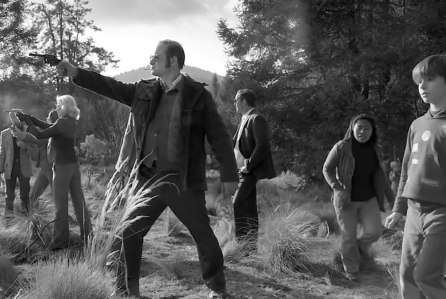This Year's Oscar Nominees Are Out. The Big Winner? People Who Like Watching Movies At Home
The Best Picture nod for Netflix's Roma marks a major victory for the streaming service.

This year's Oscar nominees have been announced, and in most ways, the list is incredibly conventional: The Best Picture nominations include a widely praised blockbuster hit by an up-and-coming young director (Black Panther), a crowd-pleasing, star-driven remake with a musical bent (A Star Is Born), a biopic about a rockstar (Bohemian Rhapsody), a couple of movies with sharp political overtones (BlacKkKlansman, Vice), a well-reviewed period drama about racial reconciliation (Green Book), as well as a pair of arthouse favorites by auteurs in their prime (Yorgos Lanthimos' The Favourite, Alfonso Cuaron's Roma).
Perhaps the most striking thing about the list is the inclusion of Roma, which was produced by Netflix. This isn't the first Oscar nod for Netflix (Mudbound scored four nominations last year, but came home empty-handed), but it is the studio's first Best Picture nomination. And with Roma scoring 10 nominations overall—tied with The Favourite for the most—it's positioned to potentially take home the Academy's highest honor.
It's perhaps the clearest sign yet that movies are moving out of the theater and into your living room, or perhaps onto the screen of your phone. Although Roma played in limited release in theaters, its primary home is on the streaming service, and that's likely where the majority of its viewers will see it. I have argued in favor of the analog theatrical experience in the past, but in this case, I think Roma's streaming availability is a good thing.
Although some of the other nominees (Black Panther, A Star Is Born), are already available to watch at home following theatrical runs, Roma's online distribution is more than a little bit unusual for such a high-profile nominee (Amazon's Manchester by the Sea was nominated for Best Picture, but it followed a relatively conventional theatrical release pattern). The small-screen availability has caused some consternation in the movie industry; as one Variety critic wrote, Netflix has been "viewed by various sectors of Hollywood as a force arrayed against the primacy of the theatrical experience." Even Cuaron himself seems slightly uncomfortable with the company's watch-at-home ethos. He's said he thinks the film is best experienced the old-fashioned way, on the big screen, declaring in December that "the complete experience of Roma is unquestionably in a movie theater."
I don't really disagree. I am a lifelong regular moviegoer, and Roma is exactly the sort of movie that would seem to justify the time and effort it takes to get out of the house and into a theater. It's a visionary, personal epic constructed of intricately designed long takes that benefit from both the larger viewing format and the (hopefully) distraction-free setting of a movie theater. It's a film to lose yourself in, rather than just another movie to have on in the background.
Yet there's something to be said for, and even gained from, Netflix's platform agnosticism. For one thing, the company's deep pockets—it reportedly had a content budget of $13 billion in 2018—and revenue model, which doesn't live or die on box office receipts, are at least part of what allow a black and white, foreign-language exercise in auteurist ambition like this to be made.
It's also what allows a movie like this to be seen. Netflix has historically been secretive about exact viewership figures, but last week the company released a glimpse into some of its numbers: Bird Box, a genre thriller starring Sandra Bullock, was watched by 80 million households during its first four weeks in release; some of its original series have been seen by about 40 million households. The streaming service now claims it accounts for a full 10 percent of the TV screen time in the country. These are huge numbers, and they make a case that Netflix can deliver audiences as large or larger than any other distributor.

Just a few years ago, a movie like Roma might still have been made and nominated for various awards. But at least on the surface, it's the sort of less-than-approachable, "difficult" film that, at least when the nominations were announced, probably would have been seen by a relatively small number of people, mostly cinema enthusiasts who live in major population centers with arthouse theaters. Although Netflix has not shared viewing figures for Roma, the film's streaming release makes a movie like this accessible to a much larger group of people. If you live in a small town far from a major urban hub, you don't have to wait several months, until long after the awards hype has settled, for a home video release.
I grew up in a place with no arthouse or revival theaters, where it was often difficult to watch critically acclaimed, limited-release favorites, or old classics on the big screen. It often took me months, in some cases years, to track down copies of certain movies, especially obscure, foreign-language films that the local video rental stores didn't carry. And when I did eventually see them, it was on VHS or later, DVD, at home, on pre-HD TV screens far smaller than what's common now. I went to the theater about as often as I could, but a lot of my favorite movies are films I've never seen on the big screen.
As it happens, that includes Roma. I watched it at home, on a large flatscreen television, and I can only express my appreciation for the movie, and my admiration for what Cuaron has accomplished with it, in terms of awe. It's not only the best movie of 2018 by a wide margin, it's one of the two or three best movies of the decade, the sort of film I'm comfortable calling a masterpiece after just one viewing, and a movie I expect to watch many, many more times. And while I'd like to see it in the theater at some point, I know that most of those viewings will occur like the first one, at home. That may not represent the complete experience, but it's a pretty good one—and, importantly, it's one that just about anyone can have.


Show Comments (22)